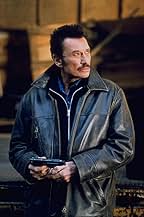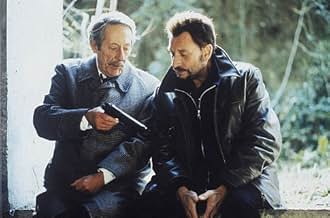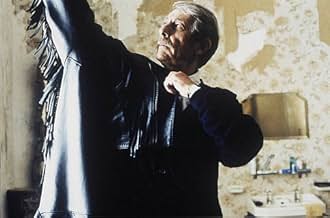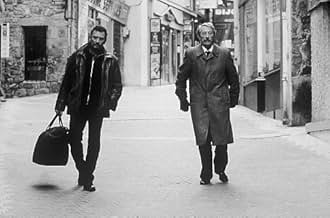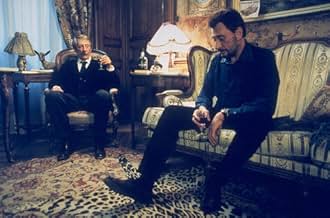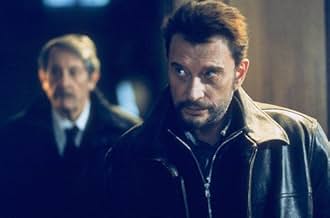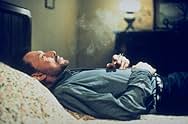L'homme du train
- 2002
- Tous publics
- 1h 30m
IMDb RATING
7.1/10
7.7K
YOUR RATING
A man steps off a train into a French village awaiting the day when he will rob the town bank. He meets a retired poetry teacher striking up a strange friendship and explore the road not tak... Read allA man steps off a train into a French village awaiting the day when he will rob the town bank. He meets a retired poetry teacher striking up a strange friendship and explore the road not taken, each wanting to live the other's life.A man steps off a train into a French village awaiting the day when he will rob the town bank. He meets a retired poetry teacher striking up a strange friendship and explore the road not taken, each wanting to live the other's life.
- Awards
- 8 wins & 10 nominations total
- Director
- Writer
- All cast & crew
- Production, box office & more at IMDbPro
Featured reviews
"Man on the Train (L'Homme du train)" is a small story of cumulative details done exceedingly well that could simply not be done by Hollywood.
The excellent leads, each charismatic in his own way, talky Jean Rochefort and taciturn Johnny Hallyday (who brings none of his pop star baggage to an American audience), are past middle age. There is a lot of Rohmer-like sitting around talking over a bottle of wine.
The emphasis is on very gradual, internal realizations by each character that are revealed by a subtle accretion of surprising little decisions, such as wearing slippers or getting a new haircut, culminating in an unpredictable, yet beautifully satisfying conclusion.
Photographed in a shades of gray palette that is almost in black-and-white, a small town and its interconnections and personalities are beautifully evoked.
The women in their lives are ancillary, which is just as well, as they are not completely believable.
The poetry teacher is too sophisticated to quote John Greenleaf Whittier, but I will, on the theme: "Of all the words of tongue or pen/the saddest are these/It might have been."
The excellent leads, each charismatic in his own way, talky Jean Rochefort and taciturn Johnny Hallyday (who brings none of his pop star baggage to an American audience), are past middle age. There is a lot of Rohmer-like sitting around talking over a bottle of wine.
The emphasis is on very gradual, internal realizations by each character that are revealed by a subtle accretion of surprising little decisions, such as wearing slippers or getting a new haircut, culminating in an unpredictable, yet beautifully satisfying conclusion.
Photographed in a shades of gray palette that is almost in black-and-white, a small town and its interconnections and personalities are beautifully evoked.
The women in their lives are ancillary, which is just as well, as they are not completely believable.
The poetry teacher is too sophisticated to quote John Greenleaf Whittier, but I will, on the theme: "Of all the words of tongue or pen/the saddest are these/It might have been."
The great Jean Rochefort plays a mild-mannered old man who's so lonely that as soon as mopey bank robber Johnny Hallyday lets a room in his empty mansion, he simply won't stop talking to him, no matter how little Hallyday says back! Both men are bored with their current lives but are intrigued by the other's.
This slow burner may not be interesting enough for many, certainly not quick enough for most. But its nevertheless a fascinating "little" film and character study. It works in the play between these two men from different worlds, who grow to aspire to see what its like to be the other person. There's no giant twist, no supernatural catch at the end, so don't be expecting it - just enjoy it for the wry, vivid look into the rapport between these two men with nothing in common.
3.5/5. A treat.
This slow burner may not be interesting enough for many, certainly not quick enough for most. But its nevertheless a fascinating "little" film and character study. It works in the play between these two men from different worlds, who grow to aspire to see what its like to be the other person. There's no giant twist, no supernatural catch at the end, so don't be expecting it - just enjoy it for the wry, vivid look into the rapport between these two men with nothing in common.
3.5/5. A treat.
This is a beautifully acted and written story of two older men dealing with regret. The dialogue is witty, but never self-conscious and the performances are great. Johnny Hallyday (The Elvis of France!) is especially surprising in his role as the bank robber at the end of his career.
The story is well paced, and unlike a lot of French movies, it's not just a bunch of talking heads, but a real story with compelling characters. The two strangers meet by hazard and forge a close relationship, each trading bits and pieces of their lives. The scene where Jean Roquefort gives Johnny his slippers is a literal manifestation of their efforts to change their lives, albeit late in life.
A lovely little film from beginning to end!
The story is well paced, and unlike a lot of French movies, it's not just a bunch of talking heads, but a real story with compelling characters. The two strangers meet by hazard and forge a close relationship, each trading bits and pieces of their lives. The scene where Jean Roquefort gives Johnny his slippers is a literal manifestation of their efforts to change their lives, albeit late in life.
A lovely little film from beginning to end!
We know this film from childhood, but the child has grown. Here we are in a provincial French city when the cowboy rides in on the iron train to transform the life of a citizen, unexpectedly, profoundly.
Jean Rochefort, with his great face of character, about to go for major surgery, a three vessel bypass, a wifeless man of regrets, a retired teacher of literature to secondary students, is about to meet his fantasy: Johnny Hollyday (the Elvis of France?) who plays a bank robber about to perform his retirement job. Meeting by apparent chance, though clearly pre-ordained, the fantasies of the lonely, anxious teacher whose love of poetry might be his most tender trait in an otherwise ruthlessly real view of the world, are set in motion. Hollyday becomes his unexpected guest...the lone hotel is closed for the season...and an excitement comes to Rochefort's life. The man has guns. There is a picture of him looking terribly western in his leather jacket, the enigmatic stranger/cowboy in the mythos of his host. Ah, to be that man, to fire that gun, to live that life of dark adventure.
It goes on to its meaningful end, not told here except to say that the last scene may be an error, a prolongation that was unnecessary and added nothing to the power of the film, nor detracted from the marvelous performance of Rochefort, who can do no wrong with any role, or Hollyday, whose acting turn here is perfect in the Robert Mitchum noir sense, but tinged with an old-world tiredness that is quite moving. All this with fine subsidiary acting, a perfectly murky Simenonoish setting, and Schubert's melancholic sounds. Ah, bon. Tres, tres bon.
Jean Rochefort, with his great face of character, about to go for major surgery, a three vessel bypass, a wifeless man of regrets, a retired teacher of literature to secondary students, is about to meet his fantasy: Johnny Hollyday (the Elvis of France?) who plays a bank robber about to perform his retirement job. Meeting by apparent chance, though clearly pre-ordained, the fantasies of the lonely, anxious teacher whose love of poetry might be his most tender trait in an otherwise ruthlessly real view of the world, are set in motion. Hollyday becomes his unexpected guest...the lone hotel is closed for the season...and an excitement comes to Rochefort's life. The man has guns. There is a picture of him looking terribly western in his leather jacket, the enigmatic stranger/cowboy in the mythos of his host. Ah, to be that man, to fire that gun, to live that life of dark adventure.
It goes on to its meaningful end, not told here except to say that the last scene may be an error, a prolongation that was unnecessary and added nothing to the power of the film, nor detracted from the marvelous performance of Rochefort, who can do no wrong with any role, or Hollyday, whose acting turn here is perfect in the Robert Mitchum noir sense, but tinged with an old-world tiredness that is quite moving. All this with fine subsidiary acting, a perfectly murky Simenonoish setting, and Schubert's melancholic sounds. Ah, bon. Tres, tres bon.
European cinema again; again originality, again stuff almost unique that I'm afraid I'll never find something similar. Here, the story about two people, and those two alone, and it is not easy two keep up ninety minutes developing their experiences. You need to have a good eye, pace, and respect for your characters.
These characters are Milan (Johnny Hallyday), a thief; and Monsieur Manesquier (Jean Rochefort), a retired literature professor. Their differences make their encounters scary. One, an old man who likes to talk and is fascinated by this mysterious obscure man in strange clothes; Manesquier enters Milan's room and imagines to be in a fantasy world he couldn't live in.
Milan is quiet and soft talking, but induces the old man into the drinking again, into excitement and adventures; and after meeting his pals he even doubts about carrying on with the only thing he came to do to this town: rob a bank. He reaches the limit of giving a literature lesson to one of Manesquier's pupils.
The camera is in love with them both, and presents each one in an original way when they are on screen. Different colors, postures, followings. Each one might hide something; there's a past, but that's not what this story that wanders through coincidences and casualties of life wants to show.
A simple aspirin, a glass of water; what can that lead to. The anxiety of a man to be part of something he never lived, on one side. On the other side the silence and intrigue of the little conversation. The glasses of wine, the lunches that seem to say much but are saying almost nothing about the characters.
The music, by Pacscal Estève, is very important to the film; giving to it a touch of Westerns style, playing to represent the state of mind and humor of the characters when we see them, or simply, not playing at all; and that's very good sometimes. Ivan Maussion's production design is also a good point for that matter, with his deserted streets and lonely places.
The screenplay results to be cultured and very intelligent. Patrice Leconte's frequent writing collaborator leaves everything in his character's hands; because the words are his. Also frequently cast by Leconte, Jean Rochefort's delivery is impressing in his measured role, that requires little but well done. It's Johnny Hallyday, however, the one who steals, or shines in his loneliness. With all those looks and his face, always full of hidden things.
Metaphors join us again, in the movie; for us to interpret. I tried, and everyone will, but I say: thank Europe for these movies; it's worth and more a kind of pleasure to watch them!
These characters are Milan (Johnny Hallyday), a thief; and Monsieur Manesquier (Jean Rochefort), a retired literature professor. Their differences make their encounters scary. One, an old man who likes to talk and is fascinated by this mysterious obscure man in strange clothes; Manesquier enters Milan's room and imagines to be in a fantasy world he couldn't live in.
Milan is quiet and soft talking, but induces the old man into the drinking again, into excitement and adventures; and after meeting his pals he even doubts about carrying on with the only thing he came to do to this town: rob a bank. He reaches the limit of giving a literature lesson to one of Manesquier's pupils.
The camera is in love with them both, and presents each one in an original way when they are on screen. Different colors, postures, followings. Each one might hide something; there's a past, but that's not what this story that wanders through coincidences and casualties of life wants to show.
A simple aspirin, a glass of water; what can that lead to. The anxiety of a man to be part of something he never lived, on one side. On the other side the silence and intrigue of the little conversation. The glasses of wine, the lunches that seem to say much but are saying almost nothing about the characters.
The music, by Pacscal Estève, is very important to the film; giving to it a touch of Westerns style, playing to represent the state of mind and humor of the characters when we see them, or simply, not playing at all; and that's very good sometimes. Ivan Maussion's production design is also a good point for that matter, with his deserted streets and lonely places.
The screenplay results to be cultured and very intelligent. Patrice Leconte's frequent writing collaborator leaves everything in his character's hands; because the words are his. Also frequently cast by Leconte, Jean Rochefort's delivery is impressing in his measured role, that requires little but well done. It's Johnny Hallyday, however, the one who steals, or shines in his loneliness. With all those looks and his face, always full of hidden things.
Metaphors join us again, in the movie; for us to interpret. I tried, and everyone will, but I say: thank Europe for these movies; it's worth and more a kind of pleasure to watch them!
Did you know
- TriviaJean Rochefort died in October 2017. Two months later, Johnny Hallyday died.
- ConnectionsReferenced in 69 minutes sans chichis: Johnny Hallyday (2015)
- SoundtracksImpromptu in A-flat Major, Op. 142 No. 2 (D. 935)
Written by Franz Schubert
- How long is Man on the Train?Powered by Alexa
Details
Box office
- Gross US & Canada
- $2,542,020
- Opening weekend US & Canada
- $41,138
- May 11, 2003
- Gross worldwide
- $7,727,906
- Runtime
- 1h 30m(90 min)
- Color
- Sound mix
- Aspect ratio
- 2.35 : 1
Contribute to this page
Suggest an edit or add missing content


